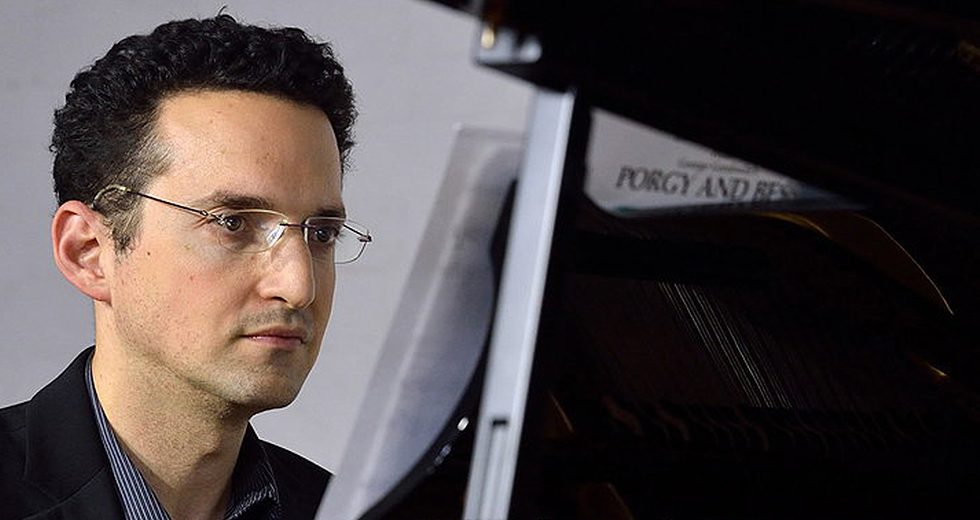
Pianist Daniel Schlosberg is Mr. Versatility. Solo recitalist. Orchestral soloist. Solo accompanist. Chamber musician. Now based in Chicago, the Los Angeles native can do it all, and he regularly gets calls for his services from a broad range of the city’s classical musicians and ensembles, including eighth blackbird, Dempster St. Pro Musica and the Avalon String Quartet, as well as others across the country.
“I definitely prefer a wide variety,” he said. “A lot of my interests are toward the outer limits of the repertoire, so I do have a big interest in early music as well as the very contemporary composers. My dad was an amateur viola da gamba player, so I grew up with the sounds of early music around me, but I’ve also been very involved with new music with various groups in Chicago and elsewhere.”
At the same time, Schlosberg does not neglect more conventional 18th- and 19th-century classical repertoire. “There is nothing I enjoy more than accompanying a Schubert song,” he said. Indeed, accompanying singers is one of his specialities, and he regularly collaborates with such artists as Chicago-based baritone Ryan de Ryke. Schlosberg studied with Gilbert Kalish, a renowned vocal accompanist, while completing his doctorate at Stony Brook University in suburban New York City, and he pursued additional training in this realm at the Britten-Pears Young Artist Programme in Aldeburgh, England, and the Franz Schubert Institut in Baden bei Wein, Austria. Since 2010, he has directed the Baltimore Lieder Weekend, which includes performances and scholarly discussions of art song.
Vocal accompaniment presents challenges for a pianist that go beyond those associated with backing a solo instrumentalist. “There is probably more flexibility that is needed,” Schlosberg said, “just because of the nature of using one’s voice, and also, of course, you have to know intimately the text, not just what the words mean but the meaning of the poem and what the composer’s reaction is to the poem.”
About the only slice of classical music that Schlosberg tends to eschew is the late romantic Russian repertoire. So don’t expect to hear him perform Rachmaninov’s Piano Concerto No. 3 or Tchaikovsky’s Piano Concerto No. 1.
Schlosberg is a member of the piano faculty at the University of Notre Dame near South Bend, Ind., but he does much of his performing in Chicago. “There’s so much going on, especially with the new music scene,” he said. “There’s more going on in New York, but there’s just so much support for the community here and everyone supports each other, so I think it’s really a healthy environment. I just like the slightly less hectic atmosphere, compared to New York. And of course, the CSO is an incredible institution and resource.”
Chicago audiences have had several opportunities to hear Schlosberg in June, and there are more to come. “It’s a fun month for me,” he said, “and very varied assignments.” Among them was a recital he presented June 3 as part of the PianoForte Salon Series Live at Pianoforte Chicago. The one-hour concert, which was broadcast live on WFMT-FM (98.7), featured excerpts from “Gaul Me Maybe: French Baroque Keyboard Music,” his latest album on the Centaur Records label, as well as works by Wolfgang Amadeus Mozart, Gabriel Fauré and Maurice Ravel.
He participates in the Chicago Symphony Orchestra’s MusicNOW program June 6 that will include the world premiere of Light Readings by CSO Mead Composer-in-Residence Samuel Adams. The 11-movement work is scored for 25 vocalists and eight instruments, including a piano with a transducer speaker used to create sine-wave resonance. Conductor Donald Nally leads members of the CSO and guest musicians in this performance, as well as Northwestern University’s Bienen Contemporary/Early Vocal Ensemble.
Then Schlosberg will join a singer and six other musicians June 15 for the final concert of the CSO’s 2015-16 All-Access Chamber Music Series. The event, which will be presented at Symphony Center’s Buntrock Hall, will feature Aaron Copland’s Piano Quartet (1950), Kaija Saariaho’s Cloud Trio (2010), Matthew Aucoin’s This Earth (2015), Johannes Brahms’ Two Songs, Op. 91 (1884), and James Matheson’s Songs of Desire, Love and Loss (2004).
On July 12, Schlosberg will team with the Chicago-based Spektral Quartet for a performance of Robert Schumann’s beloved Piano Quintet, Op. 44, under the auspices of the Rush Hour Concerts’ Summer Series at St. James Cathedral, 65 E. Huron. After a reception beginning at 5:15 p.m., the free concert starts at 5:45 p.m.
For Mr. Versatility, these summertime performances provide just the mix of styles and instrumental combinations that he thrives on.
Kyle MacMillan, former classical music critic of the Denver Post, is a Chicago-based arts journalist.